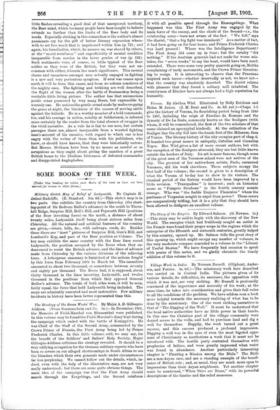The Strategy of the Seven Weeks' War. By Major A.
D. Gillespie- Addison. (Swan Sonnenschein and Co. 5s.)—In December, 1901, the Memoirs of Field-Marshal von Blumenthal were published. [n this volume may be found the Field-Marshal's diary kept during the campaign which ended with the battle of Koniggratz. He was Chief of the Staff of the Second Army, commanded by the Crown Prince of Prussia, the First Army being led by Prince Frederick Charles. In this little volume, sold, we may say, for the benefit of the Soldiers' and Sailors' Help Society, Major Gillespie-Addison criticises the strategy revealed. It should be a very edifying occupation for the German military experts who have been so severe on our alleged shortcomings in South Africa to see the blunders which their own generals made under circumstances far less perplexing. We cannot follow out the details, which, in- deed, even with the help of the illustrative map, are not very easily understood ; but there are some quite obvious things. The main idea of the campaign was that the First Army should march through the Erzgebirge, and the Second reinforce it with all possible speed through the Riesengebirge.. What happened was this. The First Army was engaged by the main force of the enemy, and the chiefs of the Second—i.e., the reinforcing army—were not aware of the fact. " We felt," says the diarist, "that a big fight was imminent." As a matter of fact, it had been going on for four hours, and Prince Frederick Charles was hard pressed ! Where was the Intelligence Department? The First Army did come up in time ; but the cavalry "did nothing." If the Austrian generals had not made far worse mis- takes, the " seven weeks," to say the least, would have been much extended. There were some very pretty quarrels going on, Moltke complaining of tardy movements, and the Crown Prince threaten- ing to resign. It is interesting to observe that the Prussians inspired such terror—whether deservedly or not, we know not— that the country was absolutely deserted. The diarist relates with pleasure that they found a solitary mill inhabited. The countrymen of Blucher have not always had a high reputation for humanity.






































 Previous page
Previous page